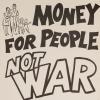I recently engaged in a discussion with a (former) pastor who thought it wise to encourage his fellow pastors on social media to not use the pulpit to sway their people to vote for their preferred candidate. “Just point people to Jesus because that’s all that matters.” The implication was to steer clear of political discussion. Period. That sounds great. Very spiritual. Very righteous. I admit, if we were approaching a presidential election decades ago, that advice may be fitting. Not so today where one party’s slogan is “Battle for the soul of a nation.” That is extremely telling. Long gone are the days where an election is primarily about the economy and raising taxes.
(For any non-Christians reading this letter, let me quickly denounce the absurd accusation that we believe Trump-or any conservative candidate-is a savior of any kind. We look only to Jesus Christ as Savior, but we also know He has a few friends placed strategically.)
Martin Luther said, “Though we be active in the battle, if we are not fighting where the battle is the hottest, we are traitors to the cause.” As hard as it may be for pastors to admit, the battle is hottest in the political arena, where so many matters of faith are at play; neutrality and silence are no longer justifiable options for the Church.
You are not doing your congregations any favors by keeping your political affiliation a secret. In fact, it should have been abundantly clear long before now where you stand (I won’t say “lean” because that implies indecisiveness). If, as a pastor, your people don’t know your political preference, that likely means they don’t know where you stand on moral issues like abortion, homosexuality/same-sex marriage (traditional family) and the US’s relationship with Israel. If you had ever spoken Biblical truth from the pulpit about these issues, there would be no question which political platform (candidate) you support. (And if you can speak one thing from the pulpit and vote contrary to that, then God help you and your poor congregation.)
The goal of Christians should not be to keep from offending anyone with their political views. You cannot use "love your neighbor" and "judge not" as justification to avoid the sensitive and controversial issues that plague humanity. There is virtually no separation between what is cultural and what is political. As Christians, we do not have a “spiritual” life and a “physical” one; how we engage with the culture (and therefore politics) is merely an extension of who we are spiritually and should be fully informed by our faith. If pastors suggest politics should be left outside the front door of the church, it would seem they are not willing to actively disciple believers in how to engage with the culture.
It’s hard. I get it. Being counter-cultural does not deliver warm fuzzies. If we are not rubbing against culture and causing some friction, we are doing it wrong. Jesus said as much. If we do not raise up a church with thick skin (more like armor) who can handle strong teaching, the Church will become unrecognizable as the Church and ineffective for the Kingdom.
I realize, pastors, addressing such topics means jeopardizing your financial support, perhaps even your reputation, to which I say, if you are not willing to be all in for the cause of Christ, then you need to find another profession. Guess what—the battle is only going to get hotter from here on out until Christ returns to this earth to set everything right. So, you may as well take this moment to reflect and decide if you are up for it. The good news is, if God is for you, who can be against you? God will provide, regardless of who walks out the door.
Many of you pastors may feel like you are already political warriors because you tackle issues such as racism, social injustice, immigration and the environment. Good for you. The body of Christ needs to recognize where there is hurt and be a source of healing in those areas. We need to be active in serving the underprivileged. But you must know those are “safe zones” politically because they align with mainstream culture. You will never face intense scrutiny from secular society for do-gooder (Christian) efforts in these areas.
On a side note, being able to easily link arms with mainstream culture for any cause is not necessarily a reason to give yourself a self-righteous pat on the back. It actually should give you pause. Many Christians have fallen for secular humanism philosophies because the line is often thin or blurred as it relates to social issues. As Charles Spurgeon wisely stated, “Discernment is not knowing the difference between right and wrong; it is knowing the difference between right and almost right.” The key difference for Christians involved in social issues should be the message conveyed through activism and the desired outcome. Although Christians may have pure motives, they should be acutely aware that the motives of secular forces they stand shoulder to should with certainly are not. I will not further digress by continuing down that extremely deep rabbit hole, but I encourage you to do deep dive research into leftist agendas if my statement is unclear to you. (You can start with CRT--critical race theory. Here's a link to get you started. https://www.gotquestions.org/critical-race-theory.html)
Pastors, please teach your people, in this world of wolves, to adhere to Jesus' less popular teachings: be wise as serpents and harmless as doves. The world of politics is full of wolves, so it is critical to apply wisdom in this area where things are never quite what they appear. There are those filled with deceit who only seek to destroy our country from within. Those same ones also wage war on the Kingdom of God (To be clear, I am not equating the US with the kingdom of God). We must push back against the evil force disguised as a peaceful religion that seeks to infiltrate and overwhelm every American system in the name of their God. This is not a season to be passive about what is happening in our world. Remember: "Battle for the soul of the nation."
Seek out credible information about all the substantive issues and share them with your people. Inspire them to reflect and evaluate where they stand, then encourage and teach them to act justly, love mercy, and walk humbly with our God--and VOTE accordingly.
I can’t even count the times I’ve heard Christians say that Jesus didn’t care about politics or something like that. I can only surmise that this notion comes from the fact that Jesus taught his disciples to obey the ruling government (although even that is debatable because the disciples later clearly did NOT obey). So, somehow, the application today is “just let the government do whatever it’s going to do and don’t worry about it.” It seems they forget that in ancient times they had no choice of participating in the political process; there was no political system for the Jews to participate in, so it is not clear what Jesus would have or would not have said if there had been. And if it were an unholy thing to revolt against tyranny, we would not have our great United States of America. Can you sincerely say that God did not have his hand on our founding fathers as they forged this country? If you cannot, then logically you should not refrain from guiding your people in how to preserve it. (It broke my heart to know my pastor friend did not think the first amendment was worthy of mention on the Sunday before this historical election.)
Paul is actually the greatest pastoral example in scripture. He is the one who raised up the early churches and taught pastors and teachers how to lead. His example shows us beyond any doubt that cultural issues were fiercely addressed within the church setting itself. It seems obvious that, if he were alive today, Paul would be preaching about the political issues and what they mean for believers.
This letter will reach you too late to change anything for this election cycle. My prayer is that you will still take it to heart and consider how to lead your congregation in the aftermath. As I said, the battle will only become more intense. Politics will impact the church more than ever before. If you believe in eschatological prophecy, you know it’s true. You may as well start practicing courage now, setting political correctness aside. It may be in our lifetime that the Antichrist comes into power. When that happens, there will be enormous political pressure. Are you ready?
















